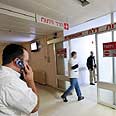
'Ministers would think otherwise if they would visit Barzilai'
With 400 patients passing through 17 beds every day and occupancy often reaching 200%, emergency room in Ashkelon hospital can't believe government's decision to delay building of new emergency facility by years. Department head: Our voices not heard because we are in periphery
Barzilai Hospital is in shock. Just a few weeks ago, the CEO of Barzilai Medical Center in Ashkelon, Dr. Shimon Scharf, announced that no patients would be admitted for 48 hours because occupancy surpassed the tolerable level.
On Sunday the cabinet authorized the relocation of the new fortified emergency room's building to a more remote spot, along with a delay in its construction, so as not to disturb ancient graves found on the site.
One of the nurses at the hospital complained, "It is always full to the brim here. There is no space."
"If they had held their meeting here in our department, if they had sat here for just a few hours, I am certain the decision would be different," continued the nurse. "They wouldn't dare reach the point in which we could have had a new emergency room and lots more beds."

Digging outside Barzilai in Ashkelon (Photo: Tsafrir Abayov)
The price for the cabinet's decision will likely be paid by the nurses and the hospital support staff, among others. It is no secret that Barzilai's inpatient wards are the most crowded, often reaching 200% occupancy in the winter. The emergency room at Barzilai, too, is among the most crowded.
The emergency room sees some 100,000 patients a year – about 400 a day – that all funnel through 17 crowded beds. Three doctors are on staff to treat those arriving at the emergency room – an internist, a surgeon, and an orthopedic.
Wait until a trauma room becomes available
Prof. Shmuel Oren, head of the Department of Internal Medicine, takes stock everyday of his crowded ward. "During the winter months, we are at 160% occupancy. In the summer, I'm happy if we are at 104% like they had at Tel Hashomer (Sheba Medical Center) when they made a ruckus. Our cries aren't heard because we're in the periphery."
"This decision will setback the hospital for many years. This is damage for years, and the situation gets worse and worse every year. The hospital is dying a gradual death, and no one is willing to sign the death certificate," continued Prof. Oren.
One of the nurses who work in the trauma room said, "This is a hospital that serves a large population of the entire region."
"Injured people from a mass-casualty event could arrive here all of a sudden, or from a Grad rocket, who need a trauma room, and they'd have to wait. If they had made a decision a while ago, we would already have been in a different state. Ultimately, it only hurts the patients," said the nurse.
Meital Yasur-Beit Or contributed to this report















